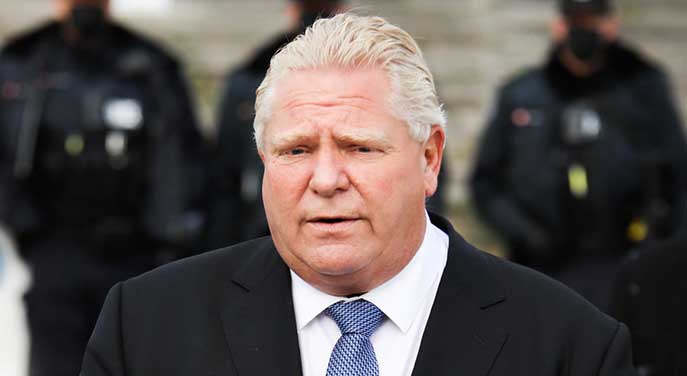 The year is only a few days old but some Canadians are ready to kick 2022 to the curb.
The year is only a few days old but some Canadians are ready to kick 2022 to the curb.
The reason is a new wave of COVID-19 restrictions imposed due to the spread of the Omicron variant.
Quebec was the first province to experience a significant increase in daily cases. Premier Francois Legault announced a shift back to virtual learning, closed restaurants and bars for in-person dining, and reduced store capacity to 50 per cent. Private gatherings were banned, houses of worship were closed (other than small gatherings for funerals) – and a provincewide curfew was instituted again.
Most provinces have implemented similar restrictions related to schools and businesses, including Alberta, B.C., Manitoba, and Newfoundland and Labrador. A small handful, like Saskatchewan, hasn’t witnessed spikes in their health-care services and have been able to avoid these measures.
Ontario remained the big question mark. Premier Doug Ford seemed determined to avoid provincial restrictions despite rising COVID-19 daily cases.
On Dec. 30, Education Minister Stephen Lecce announced a two-day delay in reopening schools for in-person learning. The switch from Jan. 3 to Jan. 5 didn’t seem like much of a hardship, all things considered.
Many Ontarians remained worried. They had seen this government change course on provincial restrictions before. They wouldn’t do it again, would they?
I’m afraid so.
Ford announced new provincial restrictions during a Jan. 3 press conference that harkened back to last year’s Step 2. Schools would be moved back online from Jan. 5 until “at least” Jan. 17. Indoor dining would be suspended for three weeks. Gyms were closed, along with attractions like museums, galleries and zoos. Social gatherings were reduced to five people indoors and 10 people outdoors. Weddings, funerals and religious services were reduced to 50 per cent capacity per room. Retail stores, malls, libraries and personal care services also returned to 50 per cent capacity.
What was the response?
Irrespective of political ideology, economic level or social status, it ranged from frustration to rage.
Yes, the Ontario Progressive Conservative government is obviously concerned about the spread of Omicron. The daily case count has been consistently above 10,000 since Dec. 29. It reached a record high of 18,445 on Jan. 1, although it decreased to 16,714 (Jan. 2) and 13,578 (Jan. 3). Ontario’s rolling seven-day average is 14,074, up from the previous week’s tally of 7,550.
Health Minister Christine Elliott also noted that 1,232 people have been hospitalized with COVID-19 and there are 248 people in ICUs. These numbers have gradually and steadily increased, largely due to Omicron.
Ford is hopeful this new set of provincial restrictions will be a short-term fix to an expanding problem. We’ll see if he’s right.
The issue for most people is the never-ending stream of government flip-flops in policy and strategy, and last-minute changes during COVID-19.
Why is it being done this way?
 The Ontario government is attempting to maximize the effect of this difficult announcement (and others) in as narrow a time frame as possible. The hope is it will minimize negative criticism and political damage that the government will undoubtedly face.
The Ontario government is attempting to maximize the effect of this difficult announcement (and others) in as narrow a time frame as possible. The hope is it will minimize negative criticism and political damage that the government will undoubtedly face.
Short-term pain for long-term gain.
There are mild similarities between the Ontario government’s strategy and the infamous Friday evening press releases utilized by the Stephen Harper and Justin Trudeau governments in recent years. The latter are strategically used to announce controversial issues as far under the radar as possible. Since the news cycle is evergreen and a late-night press release usually doesn’t have legs, the hope is the short-term reaction will come, go and disappear.
Ontario is far from the only province to use this strategy. And governments in other countries have done similar things during this pandemic.
But the ends don’t justify the means.
The personal and emotional upheaval that Ontarians face during these last-minute changes is obvious. People are angry, parents are stressed, children are disappointed, and quite a few businesses are on the brink of financial disaster. That’s why mental health issues are affecting some adults and children and why some people don’t know where their next paycheque or even meal is coming from.
Is this political strategy going to cost Ford and the PCs in this year’s provincial election?
I doubt it, and the polls don’t show it.
Nevertheless, there’s no reason to leave Ontarians constantly guessing what comes next. Be open, up front and transparent when it comes to COVID-19 models, policy matters, political strategies and strategic communications.
Honesty is the best policy. Even in the world of politics, believe it or not.
Michael Taube, a Troy Media syndicated columnist and Washington Times contributor, was a speechwriter for former prime minister Stephen Harper. He holds a master’s degree in comparative politics from the London School of Economics. For interview requests, click here.
The opinions expressed by our columnists and contributors are theirs alone and do not inherently or expressly reflect the views of our publication.
© Troy Media
Troy Media is an editorial content provider to media outlets and its own hosted community news outlets across Canada.

